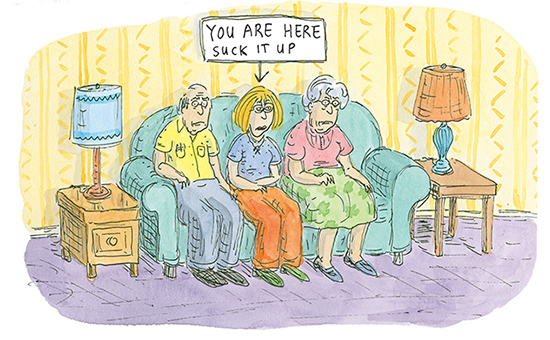Fans of Roz Chast’s cartoons in The New Yorker will not be surprised to learn that her parents were an unlikely couple: Her mother, Elizabeth, was a bossy perfectionist. Her father, George, was a sensitive man often gripped by anxiety.
In her first memoir, Can’t We Talk About Something More Pleasant?, Chast captures her parents’ long, painful decline and her struggle to deal with their descent—from their cluttered Brooklyn apartment to assisted living and eventually to hospice care. Telling the story with cartoons, text and photos, Chast leaves no aging stone unturned, revealing all the agonizing, humiliating and haunting details of growing old. If you’ve been a caregiver for an aging relative, you’re likely to find every frustrated, ridiculous or desperate thought you ever had reflected in Chast’s heart-rending and often hilarious volume.
The author/cartoonist responded to our questions about the book from her home in Connecticut.
As the book’s title makes clear, aging is not a “pleasant” topic. Why did you decide to write this book?
It wasn’t pleasant, but it was definitely interesting to me. And of course, it’s not just one’s parents who are aging. We’re all heading in that direction. Also, there were some funny, cartoon-worthy events along the way.
What personal qualities do you think you inherited from your mother? From your father?
My mother valued intelligence over looks. She didn’t care about clothes, hair or makeup. I try to care about fashion, but I have the opposite of what Frenchwomen are supposed to have: I make the least of what I’ve got. I deeply wish this were not so and I try to fight it, but it seems to be in my DNA. My father was the most anxious person I’ve ever met. He was the Mozart of anxieties. He makes me look like an amateur.

What moment as a caregiver made you want to throw up your hands and run for cover?
It was pretty much one long moment of that feeling. The question should be what moment didn’t make me want to run for cover. But one of the worst was when I was bringing my mother and father back to their apartment after visiting the terrible Place in Brooklyn and my mother collapsed in the stairwell while my father was having a panic attack because he couldn’t get the key to open the door to the apartment. That was an out-of-body experience for me.
Your parents were extremely close and did almost everything together. Did that make aging easier or harder for them?
It made it easier. They gave each other moral support.
What surprised you the most during the whole saga of caring for your parents?
I was surprised that there were no guidelines. There were no books like “What To Expect When Your Parents Are Dying.” I felt like I was making it up as I was going along.
Did you ever wish you had a sibling to help you get through this?
YES.
This book covers some deeply personal territory. Did you ever waver about holding back parts of the story?
I did think about holding back some parts. But I felt that holding back would perpetuate the problem of not talking about what it’s like to get really, really old. I don’t mean “spry”-old. I mean OLD-old.
Do you talk about “the future” with your own kids?
Not yet!!! But it’s coming . . . down . . . the . . . pike.
What did you learn about your own end-of-life preferences after observing your parents’ decline?
I don’t want to live the last couple of years of my life in bed, drinking Ensure and having somebody change my diaper. No, no, no. On the other hand, who knows what it’s like once you get there?
What one piece of advice would you give to a child-caretaker just starting on this path?
Get their papers in order: their will, all their financial information, who has power of attorney, what their “advance health care directives” are, health care proxy forms, your parents’ social security numbers, what medications they take, and so forth. And, if your kids are writer- or artist-types, it’s all material, so take notes.
I know, that’s two pieces of advice.
Cartoon © 2014 Roz Chast. Reprinted by permission of Bloomsbury.
This article was originally published in the May 2014 issue of BookPage. Download the entire issue for the Kindle or Nook.





